|
|
|
Sort Order |
|
|
|
Items / Page
|
|
|
|
|
|
|
| Srl | Item |
| 1 |
ID:
108742
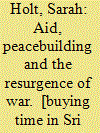

|
|
|
|
|
| Publication |
Hampshire, Palgrave Macmillan, 2011.
|
| Description |
xviii, 222p.
|
| Standard Number |
9780230240278
|
|
|
|
|
|
|
|
|
|
|
|
Copies: C:1/I:0,R:0,Q:0
Circulation
| Accession# | Call# | Current Location | Status | Policy | Location |
| 056386 | 954.9303/HOL 056386 | Main | On Shelf | General | |
|
|
|
|
| 2 |
ID:
111026
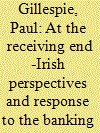

|
|
|
|
|
| Publication |
2012.
|
| Summary/Abstract |
Having enjoyed nearly two decades of economic recovery and rapid development as one of the most successful member-states of the European Union, Ireland was shocked and chastened by the global financial crisis of 2007-2008 and its traumatic impact on the country. A threefold crisis assailed its economic and political elites and citizens when the property bubble built up since 2002 exploded 6 years later. Its banking system collapsed through over-exposure to loans built up from the cheap credit made available after the euro was introduced. There was an immediate impact on state revenues when property-related windfall taxes collapsed under this pressure, exposing a yawning gap between current expenditure and revenues. And the country's economic competitiveness suffered from a runaway cost base. The paper puts these events in the context of Ireland's overall experience of European integration and its economic development. It goes on to explain how Ireland got into trouble in 2008 and tracks the major events over the next 3 years and how they were handled. Three major axes of argument about the EU/IMF rescue packages are discussed, highlighting the views of political leaders and public opinion dealing with the intensified euro zone crisis in autumn 2011. The paper goes on to assess their attitudes to EU decision-making, the role of the European Central Bank, the prospects of treaty change and Ireland's emerging position in a reconfigured Europe coming to terms with a more multi-polar world.
|
|
|
|
|
|
|
|
|
|
|
|
|
|
|
|
| 3 |
ID:
091534
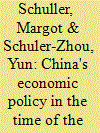

|
|
|
|
|
| Publication |
2009.
|
| Summary/Abstract |
This contribution analyses the impact of the global financial crisis on the Chinese economy and the policies implemented by the Chinese government to cope with it. We argue, first, that China has not been able to decouple its economic performane from that of the U.S. and other developed countries.
|
|
|
|
|
|
|
|
|
|
|
|
|
|
|
|
| 4 |
ID:
173745
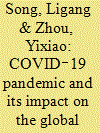

|
|
|
|
|
| Summary/Abstract |
The COVID‐19 pandemic broke out at a time when there were heightened uncertainties in the global economy. Understanding these uncertainties provides an important background for analyzing the impact of the pandemic on the global economy, assessing the effectiveness of policy measures in combating the pandemic and reviving the global economy, and predicting the trajectory of the economic recovery in the post‐pandemic era. We analyze how COVID‐19 would likely deepen an existing malaise in the global economy, and what could be done to address these problems while managing the economic recovery. We argue that three fundamental factors that could lead to a solid recovery in the post pandemic era are structural reform, new technology and re‐integration. They could be managed by instituting a new “global social contract.” Supported by strong public policies at all levels, especially at national level, these three factors could bring about the salvation of the global economy as it recovers or re‐emerges from the pandemic crisis.
|
|
|
|
|
|
|
|
|
|
|
|
|
|
|
|
| 5 |
ID:
119635
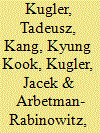

|
|
|
|
|
| Publication |
2013.
|
| Summary/Abstract |
Research on conflict traditionally focuses on its initiation, duration, and severity, but seldom on its consequences. Yet, demographic and economic recovery from the consequences of war lasts far longer and may be more devastating than the waging war. Our concern is with war losses and post-war recovery leading to convergence with pre-war performance. To test this proposition, we choose the most severe international and civil wars after 1920. We find that all belligerents recover or overtake demographic losses incurred in war. Economic assessments differ. The most-developed belligerents recover like a "phoenix" from immense destruction in one generation. For less-developed societies, the outcomes are mixed. The less-developed belligerents recover only a portion of their pre-war performance. The least-developed societies suffer the most and fall into lasting poverty traps. The overlapping generation growth model accounts for such differences in recovery rates based on pre-war performance challenging arguments from Solow's neoclassical growth perspective. Our results imply that foreign aid is incidental to the post-war convergence for the most-developed societies, can prompt recovery for the less-developed societies, and is not effective-unless it is massive and sustained-for the least-developed societies. World War II may provide a poor guide to current post-war challenges in Iraq and in Afghanistan.
|
|
|
|
|
|
|
|
|
|
|
|
|
|
|
|
| 6 |
ID:
120083
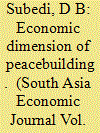

|
|
|
|
|
| Publication |
2012.
|
| Summary/Abstract |
This article studies economic dimension of peacebuilding, concentrating on post-conflict economic recovery and development (PCERD) in Nepal. The current peace process in Nepal has a historical opportunity to address economic root causes of the armed conflict and lay a foundation for inclusive economic development. However, the economic dimension of peacebuilding has been sidelined by the contentious transitional politics in the Nepali peace process. Taking a maximalist approach to development, this article argues that PCERD in Nepal should be understood as a multiple-faceted long-term process which might incorporate both short-term and long-term priorities. While the short-term priority should target at delivering the economic dividends of peace in the immediate aftermath of the conflict, the long-term priority should be geared towards addressing the economic root causes of the preceding armed conflict as well as laying the foundation for an inclusive economic development. It should be accomplished by taking into account a wider range of the social, economic, political, psychosocial, and security related needs and aspirations of the conflict-affected people as well as the wider populace. Making an analysis from a political economy perspective, this article also discusses potential barriers to PCERD and finds that lack of commitment by the key political actors to engage in policy debates and discussions around economic recovery and development and dwindling post-conflict public security are the barriers to economic recovery and development in post-conflict Nepal.
|
|
|
|
|
|
|
|
|
|
|
|
|
|
|
|
| 7 |
ID:
128321
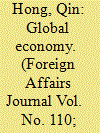

|
|
|
|
|
| Publication |
2013.
|
| Summary/Abstract |
The year 2013 continues to witness profound and complex changes in the international economic landscape. The underlying impact of the international financial crisis remains, and the recovery of the global economy is unstable, unsustainable and uneven. China has maintained steady economic growth through vigorous reform, and actively participated in global economic governance, making important contribution to global growth.
|
|
|
|
|
|
|
|
|
|
|
|
|
|
|
|
| 8 |
ID:
133421
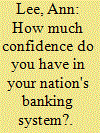

|
|
|
|
|
| Publication |
2014.
|
| Summary/Abstract |
The global banking system is the fundamental conduit of value within nations and across borders. Since the last global financial crisis, however, the role of banks as a repository of value has come increasingly into question. Today, with a fragile recovery in so much of the world, banks and those who manage and regulate them are under attack. We asked our panel of global experts how this crisis of confidence is playing out in their nation or region.
|
|
|
|
|
|
|
|
|
|
|
|
|
|
|
|
| 9 |
ID:
101899
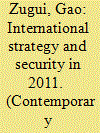

|
|
|
| 10 |
ID:
126799
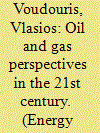

|
|
|
|
|
| Publication |
2014.
|
| Summary/Abstract |
Forty years ago, the world experienced the "first oil shock". Back then the world had just ended a period of strong economic growth in the developed world, with rising US oil imports, and began a period of turbulence in the price of oil and for many national economies. Back then (as now) it was recognised that oil price rises might snuff out economic recovery. Drawing on the names of the scenarios which Shell's planners introduced at that time, we were passing through "The Rapids" and about to enter a "World of Internal Contradictions", in recent years there have again been many indicators of a "World of Internal Contradictions". and with the financial crisis and turbulence in oil markets those of "The Rapids" too. This issue is therefore timely, as many of those earlier challenges are still with us.
|
|
|
|
|
|
|
|
|
|
|
|
|
|
|
|
| 11 |
ID:
094519
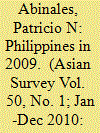

|
|
|
| 12 |
ID:
109563
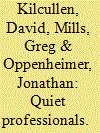

|
|
|
| 13 |
ID:
113906
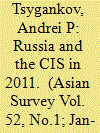

|
|
|
|
|
| Publication |
2012.
|
| Summary/Abstract |
During 2011, Russia made progress in recovering from the global financial crisis and moved toward further political centralization. Moscow also continued to prepare for an uncertain new world by pursuing pragmatic relations with Western and non-Western powers and by seeking to increase its influence among the states of the Commonwealth of Independent States.
|
|
|
|
|
|
|
|
|
|
|
|
|
|
|
|
| 14 |
ID:
107231
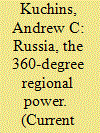

|
|
|
|
|
| Publication |
2011.
|
| Summary/Abstract |
" For the first time in its history..Russia finds itself surrounded by states and political groupings that are economically, demographically, and politically more dynamic than itself."
|
|
|
|
|
|
|
|
|
|
|
|
|
|
|
|
| 15 |
ID:
094474
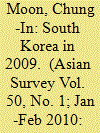

|
|
|
| 16 |
ID:
160388
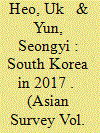

|
|
|
|
|
| Summary/Abstract |
The biggest story of 2017 in South Korea was the impeachment of President Park Geun-hye and the election of Moon Jae-in, shifting power from conservative to progressive. The economy showed signs of recovery despite multiple concerns. The North Korean nuclear crisis intensified tensions in the region.
|
|
|
|
|
|
|
|
|
|
|
|
|
|
|
|
| 17 |
ID:
094666
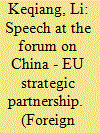

|
|
|
| 18 |
ID:
187612
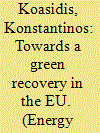

|
|
|
|
|
| Summary/Abstract |
To tackle the negative socioeconomic implications of the COVID-19 pandemic, the European Union (EU) introduced the Recovery and Resilience Facility, a financial instrument to help Member States recover, on the basis that minimum 37% of the recovery funds flow towards the green transition. This study contributes to the emerging modelling literature on assessing COVID-19 vis-à-vis decarbonisation efforts, with a particular focus on employment, by optimally allocating the green part of the EU recovery stimulus in selected low-carbon technologies and quantifying the trade-offs between resulting emissions reductions and employment gains in the energy sector. We couple an integrated assessment model with a multi-objective linear-programming model and an uncertainty analysis framework aiming to identify robust portfolio mixes. We find that it is possible to allocate recovery packages to align mitigation goals with both short- and long-term energy-sector employment, although over-emphasising the longer-term sustainability of new energy-sector jobs may be costlier and more vulnerable to uncertainties compared to prioritising environmental and near-term employment gains. Robust portfolios with balanced performance across objectives consistently feature small shares of offshore wind and nuclear investments, while the largest chunks are dominated by onshore wind and biofuels, two technologies with opposite impacts on near- and long-term employment gains.
|
|
|
|
|
|
|
|
|
|
|
|
|
|
|
|
|
|
|
|
|